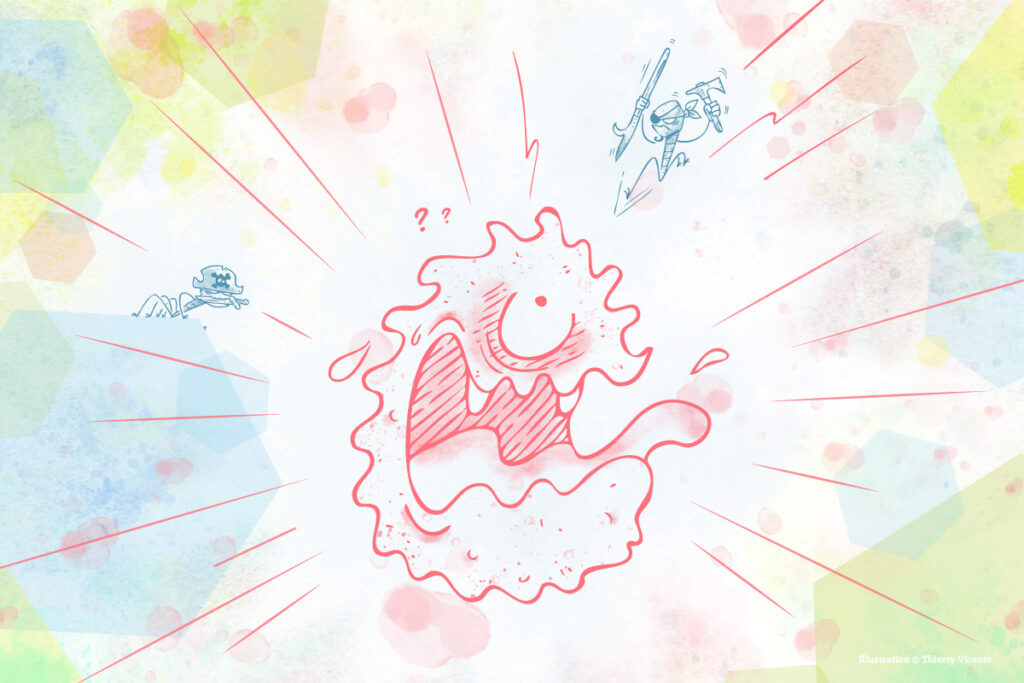[LUM#2] Viruses that want to do us good
It treats infections without the use of antibiotics. Long forgotten, phage therapy could well be making a comeback.

Millions of viruses
There are 1 million phages in every drop of seawater, 40 million in every gram of soil, and 100 million in our intestines. Bacteriophage viruses are the most abundant microorganisms on our planet. " Their total number is estimated at1031," say Oliver Kaltz and Michael Hochberg. " As small as they are, if you put them all end to end, you would get a chain 100 million light-years long!" An inexhaustible resource.
They have saved millions of lives. They? Antibiotics: drugs that have revolutionized medicine since Alexander Flemming discovered penicillin in 1928. But yesterday's heroes have lost their luster. Today, they are being singled out: their excessive use over decades is responsible for the emergence of multi-resistant bacteria, on which they no longer have any effect...
Resistance
This is a worrying situation for Michael Hochberg, a researcher at the Institute of Evolutionary Sciences in Montpellier:"It is now estimated that an antibiotic is only really effective for 5 to 10 years. During this time, very few new molecules are discovered." How will we fight bacteria in the future? Perhaps with a weapon that is not new: bacteriophages. "These natural enemies of bacteria attach themselves to their outer envelope, pierce their cell wall, and inject their genetic material. They then multiply inside their host, causing its death," explains Oliver Kaltz, also a researcher at ISEM.
These "phages" enjoyed their moment of glory after their discovery by Frenchman Felix d'Hérelle in 1917. They are still used today in some Eastern European countries such as Georgia and Poland, but they fell into oblivion in Western countries after the 1940s. The reason? The rise of antibiotics, then considered the ultimate weapon against all bacterial infections. "Today, antibiotics have reached an impasse, which is sparking renewed interest in phage therapy," explain the researchers.
Virus alerts
Where antibiotics attack bacteria indiscriminately—including the "good" bacteria that make up our intestinal flora—phages are more selective: each virus generally targets a specific bacterium."Phage therapy offers a tailor-made solution, whereas antibiotic therapy is more like off-the-peg,"explains Oliver Kaltz. This targeted therapy has another advantage: it limits the development of resistance."If a bacterium mutates and becomes resistant to the phage, the phage will also mutate to circumvent the resistance. This is called a co-evolutionary process," explain the ISEM researchers, who are studying this co-evolutionary process in the laboratory and its potential importance for phage therapy.
Phage therapy could therefore help combat multi-resistant bacteria, for which there is no longer any effective treatment. "Some French doctors have used phages to treat patients whose cases were hopeless, and they have sometimes achieved spectacular results, "explains Oliver Kaltz.
Could phages one day replace our trusty old antibiotics? Researchers say no: "The idea is rather to develop a therapy combining bacteriophages and antibioticsto increase the treatment's effectiveness." This would also significantly reduce the use of these drugs and thus limit the development of antibiotic resistance.
Legal fog
The benefits of phage therapy are beginning to be recognized by public authorities: in a 2012 report, the Centre d'analyse stratégique, a French institution providing expertise and decision support, proposed"clarifying the regulatory status of phage therapy and setting up a research program to evaluate its therapeutic potential."
However, the path to phage therapy remains fraught with obstacles. "It is not taught in medical school and remains unknown to most practitioners," the researchers point out. And despite official recommendations, its regulatory status remains unclear. "Viruses are living organisms and are not made up of a single, well-defined active molecule. Under European legislation, they therefore do not have the same status as a chemical drug," explains Oliver Kaltz. And so they do not generate the same enthusiasm from the pharmaceutical industry. "Especially since these living organisms cannot be patented," adds Michael Hochberg.
Without a clear status, it remains difficult to obtain authorizations to test the effectiveness of phage therapy, researchers lament . However, this situation is beginning to change with the arrival of the first clinical trials (see box). The coming years will be decisive for the revival of a therapy that has been all but forgotten, but which shows such promise.
Phage therapy under trial
In 2013, Europe launched a clinical trial called Phagoburn. The aim was to test two bacteriophage cocktails against bacterial skin infections in severe burn victims. The trial is being conducted in 11 burn centers in France, Switzerland, and Belgium. The French research project Phosa, launched in September 2015, aims to develop a mixture of phages to combat the staphylococci responsible for osteoarticular infections. Veterinary medicine is also interested in the therapeutic potential of these viruses: in Germany, start-ups are developing phage cocktails for use against bacterial infections in livestock.
Find UM podcasts now available on your favorite platform (Spotify, Deezer, Apple Podcasts, Amazon Music, etc.).